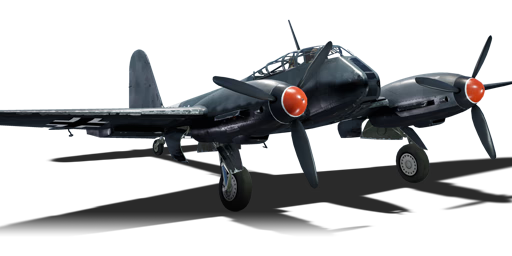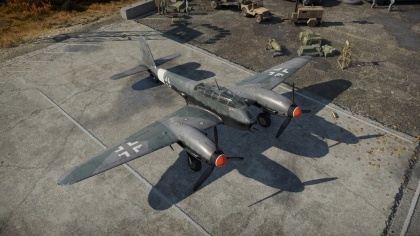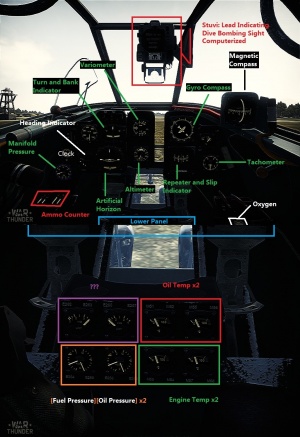Me 410 A-1/U2
Contents
| This page is about the German twin-engine fighter Me 410 A-1/U2. For other uses, see Me 410 (Family). |
Description
The Me 410 A-1/U2 is a rank German twin-engine fighter
with a battle rating of (AB), (RB), and (SB). This aircraft has been in the game since the start of the Open Beta Test prior to Update 1.27.
General info
Flight Performance
With its size, heavy arrangement and Armour you could be forgiven for misjudging the Me 410 A-1/U2's agility.
Two Daimler-Benz DB 603A V12 engines produce 1,726 HP each giving the aircraft power to weight ratio of 0.56 Hp/kg (compared to the BF 109 G-6's 0.64 Hp/Kg) which allows it to accelerate extremely well compared to other aircraft of its size and better than many single-engine fighters. Although the top speed of 640 km/h is nothing to brag about (don't expect to get over 600 Km/h during a battle) it is still a capable aircraft speed-wise as it will not rip its wings below 750 Km/h and cannot rip them in a turn. Stall Speed is 130 Km/h and 120 Km/h with Combat flaps extended. Despite what many believe the Me 410 can climb at an average of 20 M/s at 15 degrees up to 4000m, depending on the map and from then forward continues at 10-15 M/s till 7000m where its performance drops significantly.
The Me 410 can also turn well for its size, provided you are between 280 and 600 km/h. Combat flaps at speeds below 400 Km/h improve turn time and low-speed performance greatly. The flaps on the Me 410 provide a lot of lift and this combined with the good acceleration allows you to recover from stalls extremely quickly, or prolong the time it takes to stall by a large amount.
Also tying in with the acceleration is the Me 410's Air brakes, the combination of Air brakes and good acceleration allows you to manipulate your energy more easily than most fighters. The Air breaks allow you to slow down quickly to force an overshoot, avoid exceeding 750 Km/h, give yourself more time to fire at targets or stop an enemy from forcing you to overshoot and then regain your speed faster than your foe.
| Characteristics | |||||||
|---|---|---|---|---|---|---|---|
| Stock | |||||||
| Max Speed (km/h at 6,700 m) |
Max altitude (meters) |
Turn time (seconds) |
Rate of climb (meters/second) |
Take-off run (meters) | |||
| AB | RB | AB | RB | AB | RB | ||
| 601 | 587 | 31.9 | 32.8 | 7.8 | 7.8 | 444 | |
| Upgraded | |||||||
| Max Speed (km/h at 6,700 m) |
Max altitude (meters) | Turn time (seconds) | Rate of climb (meters/second) |
Take-off run (meters) | |||
| AB | RB | AB | RB | AB | RB | ||
| ? | ? | ??.? | ??.? | ??.? | ??.? | 444 | |
Details
| Features | ||||
|---|---|---|---|---|
| Combat flap | Take-off flap | Landing flap | Air brakes | Arrestor gear |
| ✓ | ✓ | ✓ | ✓ | X |
| Limits | ||||
|---|---|---|---|---|
| Wing-break speed (km/h) |
Gear limit (km/h) |
Combat flap (km/h) |
Max Static G | |
| + | - | |||
| 480 | ~10 | ~4 | ||
| Optimal velocities | |||
|---|---|---|---|
| Ailerons (km/h) |
Rudder (km/h) |
Elevators (km/h) |
Radiator (km/h) |
| < 360 | < 360 | < 460 | > 265 |
| Compressor (RB/SB) | ||
|---|---|---|
| Setting 1 | ||
| Optimal altitude | 100% Engine power | WEP Engine power |
| 5,300 m | 3,020 hp | 3,330 hp |
Survivability and armour
The aircraft's wings leading edges and critical components are armoured. although this armour will help prevent low energy or small calibre projectiles from damaging the airframe it cannot be relied on to prevent damage from anything other than rifle calibre (7.62 mm, 7.7 mm, 7.92 mm) rounds and even then it is unlikely to come out unscathed. The Me 410's armour should be more or less thought of as a last resort if you know you're going to be hit at least you have some protection.
- 8 mm steel - front of cockpit (either side of the glass)
- 5 mm steel - wings leading edge (in front of fuel tanks)
- 8 mm steel - prop hub and gear bay
- 9 mm steel - top and bottoms of wings (around the liquid cooling system
- 8 mm steel - plates in the tail
- 8 mm steel - bulkhead aft of gunner
- 8 mm steel - between gunner and pilot
- 12 mm steel - pilot's headrest
- 60 mm bulletproof glass - in front of the pilot (inside aircraft)
Armaments
Offensive armament
The Me 410 A-1/U2 is armed with:
- 2 x 20 mm MG 151/20 cannon, chin-mounted (250 rpg = 500 total)
- 2 x 20 mm MG 151/20 cannon, cheek-mounted (350 rpg = 700 total)
- 2 x 7.92 mm MG 17 machine gun, cheek-mounted (1,000 rpg = 2,000 total)
When most players encounter a Me 410 of any variant they won't often think past the aircraft's heavy armament, the A1/U2 is a prime example of this with 4 x 20mm MG 151/20 Cannons and 2 x 7.92mm MG 17 Machine guns in the nose. Although your armament is very effective for hunting bombers in most scenarios, fighter aircraft should be your primary target.
Suspended armament
The options available for the Me 410 A-1/U2 are:
- Without load
- 4 x Wfr.Gr.21 rockets
Defensive armament
The Me 410 A-1/U2 is armed with:
- 1 x 13 mm MG 131 machine gun, 2 x beam turret (500 rpg = 1,000 total)
Usage in battles
This aircraft is great for conquering airbases because you can use it to approach very close to the ground and very, VERY fast up to the very last moment. This is because of the "Hornisse"'s effective airbrake. When running towards the runway, don't hesitate to put the pedal to the metal up to really shortly before touchdown, then push off the air-brake, gear and all flaps (in that order). Ignore all warning and try to touch-down with about 200-240 km/h.
It is also suitable for chasing all sorts of bombers. Due to its heavy nose armament, taking down nearly any enemy is just a matter of seconds.
Your greatest advantage, however, is the planes' speed, certainly not it's manoeuvrability. Never forget that!
For this reason, always try to get into power fighting when it comes to taking on single-engined enemies. Try to stay in a group. Your defence weaponry will serve you as well as it will your allies.
For Simulator battle pilots, the aircraft's Cockpit is not clean but allows you to lead your target more accurately due to the hanging gun sight and partially glass nose
Manual Engine Control
| MEC elements | ||||||
|---|---|---|---|---|---|---|
| Mixer | Pitch | Radiator | Supercharger | Turbocharger | ||
| Oil | Water | Type | ||||
| Not controllable | Controllable | Not controllable | Controllable | Combined | Not controllable | Not controllable |
Modules
| Tier | Flight performance | Survivability | Weaponry | ||
|---|---|---|---|---|---|
| I | Fuselage Repair | Radiator | Offensive 7 mm | Turret 13 mm | |
| II | Compressor | Airframe | New 7 mm MGs | New 13 mm MGs (turret) | |
| III | Wings Repair | Engine | Offensive 20 mm | R6 modification | |
| IV | Engine Injection | Cover | New 20 mm cannons | ||
Pros and cons
Pros:
- Heavy armament: 4 MG151, when you research the belts and use air target belts, you are firing mostly Minengeschosse!
- Nose-mounted armament gives a very dense cone of fire
- Its defensive armament, once fully installed, is remarkably effective, especially when it comes along with a skilled crew
- Good traverse arcs for the 13mm machine guns
- Can carry bombs even with stock model
- Reasonably fast for a twin-engine fighter
- The Me 410's well armoured fuselage is quite durable and withstands a good punch.
- It can reach amazing high levels of speed within its class, which is especially effective when fleeing from the enemy
- Armament combined with her speed makes her an excellent bomber hunter
Cons:
- Large target for enemy aircraft
- Subpar manoeuvrability; even a few bombers can out-turn it
- Pilot can be vulnerable in a head-on attack
- Like most twin-engine planes, the "Hornisse" is not as manoeuvrable as a single-engined fighter
- When pulling her up, she loses speed extensively
- As with most German heavy fighters, the fuselage durability doesn't extend to the wings
- Lack of large calibre cannons or bombs makes this the overall worst variant of the 410 for ground attack
History
Describe the history of the creation and combat usage of the aircraft in more detail than in the introduction. If the historical reference turns out to be too long, take it to a separate article, taking a link to the article about the vehicle and adding a block "/ History" (example: https://wiki.warthunder.com/(Vehicle-name)/History) and add a link to it here using the main template. Be sure to reference text and sources by using <ref>, as well as adding them at the end of the article. This section may also include the vehicle's dev blog entry (if applicable) and the in-game encyclopedia description (under === Encyclopedia Info ===, also if applicable).
In-game description
"By February 1944, the designation ""Hornisse"" (""Hornet"") was finally assigned to the Me.410A planes, and several ""factory conversion kits"" (Umbausätze) were developed for them to increase their firepower or ensure that they were able to perform various special missions.
The U1 kit, used both on high-speed bombers and ""destroyers"" (the Me.410A-1/U1 and the Me.410A-2/U1), allowed mounting one Rb 75/30, Rb 50/30, or Rb 20/30 camera onto the central fuselage.
The U2 kit, for high-speed bombers, consisted of a WB 151 ventral container with two additional 20 mm Mauser MG 151/20 cannons with 250 rounds each, in drum magazines. The cannon container was installed in place of the Me.410A-1/U2's bomb bay.
Me.410A-2/U2 night fighters had not only WB 151 containers but also a FuG 220 radar with dipole antennas in the forward fuselage and flame arresters in the plane's exhaust pipes.
The need to repel American heavy bombers running daytime raids over Germany forced the Luftwaffe command to search for a way to arm Air Defence Force fighters with powerful large-calibre weapons. And so, an R2 version of the Rüstsatz kit was developed. The Me.410A-2/R2 had its 7.92 mm Rheinmetall-Borsig MG 17 machine guns removed and a pair of 30 mm Rheinmetall-Borsig MK 108 cannons mounted in a WB 108 container in the bomb bay. The planes were also fitted with ZFR 4a telescopic gun sights.
An exotic weapon was tested on one Me.410A-1: a 210 mm, six-chamber WGr 21 revolving rocket launcher. The launcher was assembled in the bomb bay, with one of the launch tubes protruding beyond the contours of the fuselage. Since the drum rotated quickly, all six rockets could be released at the target in one gun run. The first test fire, performed in February 1944, proved to be unsuccessful, but fine-tuning of the weapon continued. The revolving launchers were mounted on several more Me.410 planes for operational service tests, but the idea never progressed any further."
Media
Excellent additions to the article would be video guides, screenshots from the game, and photos.
See also
Links to the articles on the War Thunder Wiki that you think will be useful for the reader, for example:
- reference to the series of the aircraft;
- links to approximate analogues of other nations and research trees.
External links
Paste links to sources and external resources, such as:
- topic on the official game forum;
- encyclopedia page on the aircraft;
- other literature.
| Germany twin-engine fighters | |
|---|---|
| Messerschmitt | Bf 109 Z-1 |
| Me 410 A-1/U2 · Me 410 B-1/U2 | |
| Dornier | Do 17 Z-7 · Do 217 J-1 · Do 217 J-2 · Do 217 N-1 · Do 217 N-2 |
| Focke-Wulf | Ta 154 A-1 |
| Junkers | Ju 88 C-6 · Ju 388 J |






